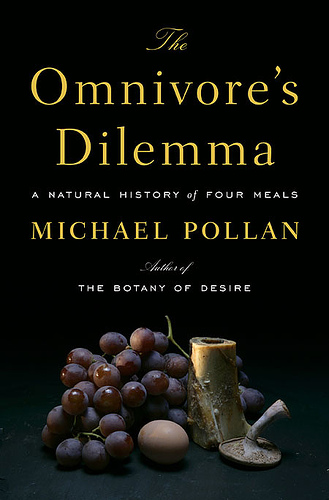
|
The Omnivore’s Dilemma: A Natural History of Four Meals Michael Pollan ISBN: 978-0143038580 |
In this world of evolution, the fittest survives. Surely we homo sapiens are the reigning king on top of this game. “No,” said Michael Pollan. “It is corn.” The way he described it, we human race slaves to expand the kingdom of corn. We labor hard, dispense tremendous amount of energy, even sacrifice our lives for corn to proliferate. Yes, over two third of what Americans eat contain corn-derived elements.
Mr. Pollan prepared 4 meals: one for the industrial food system, one for industrial organic system, one from an almost completely self-sufficient farm, and the last one hunted and gathered without spending any money. He traced the ingredients of these 4 meals to their origins. The book narrates his captivating journeys.
Like anyone who’s passionate about a subject, Mr. Pollan became a bit preachy from time to time. Is it wrong to eat meat? He struggled and debated with himself and rationalized that meat-consumption is not only good for the body but also “good to think.” He went religious on Polyface Farm’s lifestyle, painting almost an utopia, even when he literally killed with his own hands. The sermon on hunting was quite long. I imagine, as a person who respect nature a lot, it was a real difficult mental journey for him. He was overwhelmed when he must “dress” his prey, I think, by the gravity of actually terminating a wild life. The mushroom education, however, is fascinating. I never knew the difference between two kinds of mushroom and had no idea that the “fruit” of the mushroom is only a small part of its organism.
Yet I pondered, and eventually disagreed, on his central thesis: that small-scaled, wholly sustainable, neighborhood-only farms are best for man-kind. The utopia cannot feed 7 billion people on this earth and will become a system just for the environmentally conscious with a fat wallet.
This world needs the next green revolution to feed its growing population. Otherwise, more unpleasant, even cruel, consequences, such as food riots, war, or famine, ensue. Somehow, the “management intensive” Polyface Farm does not seen to be the right answer to, literally, world-hunger.
One thing is alarmingly obvious, Americans are literally dying eating. They are drowning in the sea of cheap corns. After reading this book, I see Americans like those foie gras producing geese. Both are fattened and slowly killed by over-eating, only Americans do it voluntarily and wastefully.
Eat less, I sworn to myself.
This book is widely reviewed, including one from New York Times. Check out my Delicious link.

One Response to We are what we eat